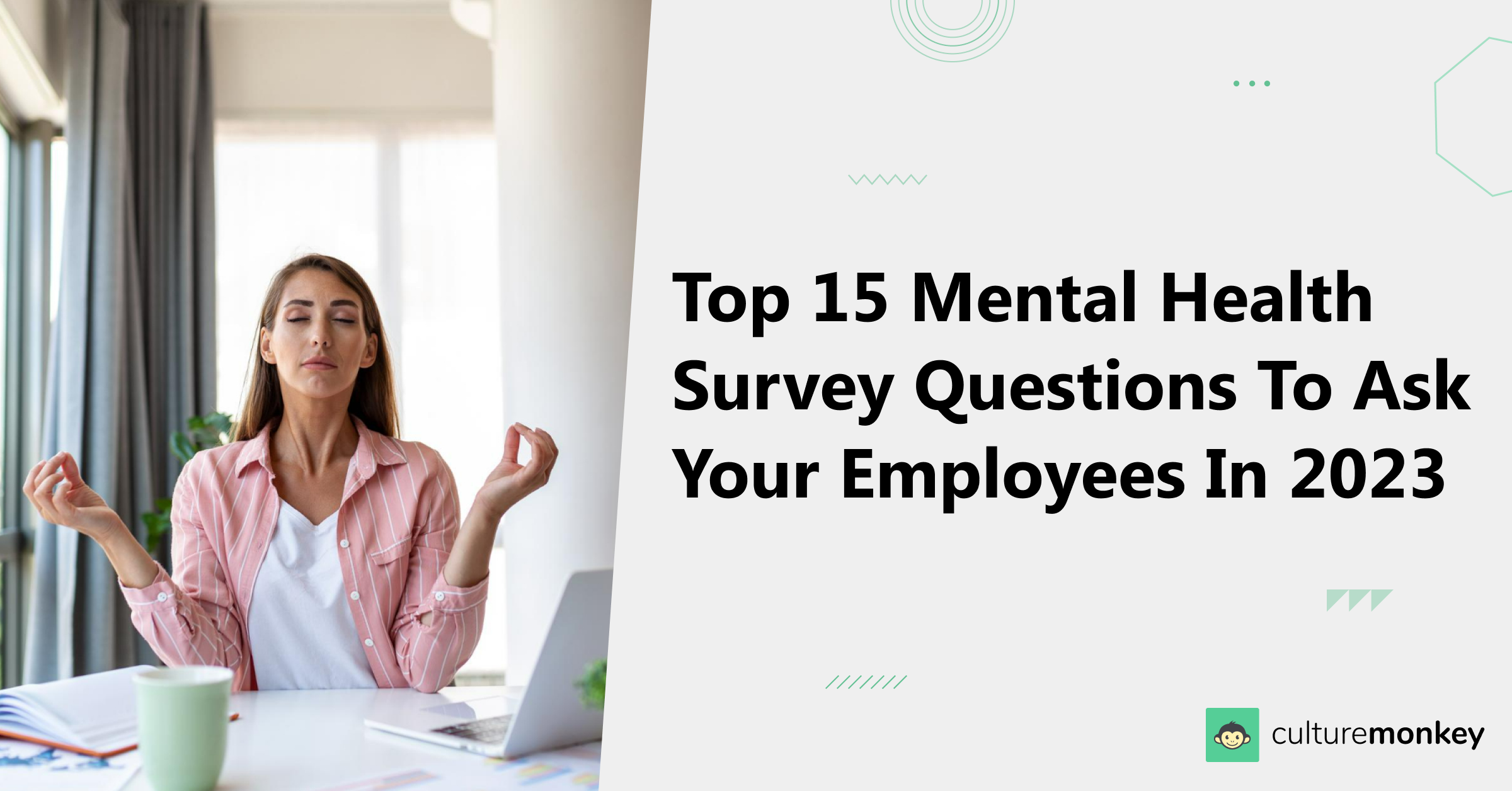In recent times, everyone has learned that social interactions play a critical role in employees’ overall mental health. The crisis we faced manifested societal disconnection between people in the workplace and at home.
With that said, employee mental health surveys have never been more crucial.
Mental health and mental wellness surveys are top of the workplace’s agenda. Employers are stepping forward to support employees’ mental health through health initiatives, resource groups, workplace benefits, and other programs. According to a survey conducted by Oracle with 12,000 employees, 89% felt that the pandemic had a negative impact on their mental health.
Here’s where the employees’ mental health survey comes in to help you understand how you should, as a people leader, support your employees’ mental health. Let’s dig deep into why you must implement mental health surveys before getting to the top 25 questions.
Table of contents:-
- Why are employee mental health surveys important?
- Work-related risk factors that can harm mental health
- How can mental health issues affect work?
- Where does remote working fall short?
- How can employers support employees’ mental health?
- Hybrid work and mental health of employees
- 15 best mental health survey questions
Why are employee mental health surveys important?

The pandemic put mental health issues under the spotlight amongst people like never before. But for many, mental health conditions have already existed behind the curtains due to some pre-existing conditions.
So, mental health issues aren’t something employees can “leave outside the office” or “turn off.” The conditions will affect employees in their workplace. According to the American Institute of Stress, 83% of U.S. workers suffer from work-related stress, leading them to anxiety and stress at the workplace.
And the pandemic wasn’t easy on employees either, as it harmed their mental health more than ever. According to Mental Health America, depression ranks third among employees’ workplace problems, following stress and family crises, and it costs over $51 billion in lost productivity and absenteeism and $26 billion in direct treatment costs. So, if left untreated, depression in the workplace can cost nearly as much as AIDS or heart disease.
So, the days of skipping or ignoring employees’ mental health are long gone. Positive mental health is vital as it allows coping with challenges at home and work.
A culture of positive workplace mental health helps employees remain agile while changing roles and responsibilities. It also guides employees to flourish in their careers, boosts resilience, and manages stress, ultimately allowing them to aim for their highest potential.
Creating a secular workspace for employees at all levels without any discrimination is crucial and achievable through mental health surveys. You must implement the mental health survey to ensure valuable feedback and retain valuable talents.
Work-related risk factors that can harm mental health

Work-related risks that harm mental health are psychosocial risks related to specific characteristics of the workspace such as, work schedules, or lack of opportunities for employees’ career development, etc. Although psychosocial risks can be in all sectors, some employees are more likely to develop them because of what they do.
According to the World Health Organization, globally, $12 billion working days are lost annually due to anxiety and depression at the cost of $1 trillion yearly in lost productivity.
Risk factors that harm employees in the workplace are:
- Being under-skilled or under-use of skills
- Excessive workloads
- Lack of control over the work structure
- Inflexible, unsocial, or long hours
- Poor or unsafe working conditions
- Inadequate workplace culture that enables negative behaviors
- Limited support or supervision
- Harassment, bullying, or violence
- Exclusion and discrimination
- Under-promotion or over-promotion
- Job insecurity or poor investment
- Conflicting work/home demands
Preventing mental health conditions at the workplace is about managing psychosocial risks. Employers should conduct regular interventions through mental health surveys to remove workplace risks of mental conditions. Not only that, mental health surveys can also help to modify or remove workplace risks to employees’ mental health and pave the way to provide flexible working arrangements and take necessary actions.
How can mental health issues affect work?

According to Freshbooks, an average human spends approximately 90,000 hours in the workplace of their life, which is a seriously significant amount of time.
So, work should also be the source of happiness and fulfillment, but often mental health issues affect the work and the work-life balance. The following are the ways that mental health can affect work:
Lack of engagement
Employee engagement displays how the employees feel, think, and act in the emotional connection towards their organization, job, and team. Engaged employees are motivated to work harder, develop greater solutions, solve problems, stay loyal, and grow along with the company to contribute to organizational success.
According to Gallup, only 36% of U.S. employees are engaged in their workplace and work. To track employee engagement and pinpoint where to devote your efforts, you must determine the engagement level metrics through employee engagement and mental health surveys.
Misaligned communication
Proper workplace communication is crucial as it helps to boost employee productivity, morale, satisfaction, and engagement. Effective communication is what decides team cooperation and collaboration, ultimately leading to effective workplace culture.
With the pandemic and continuous remote work practices, communication challenges will be around for some time. According to Business Wire, 71% of employees reported feeling more productive when they are more connected to their colleagues. So, leading businesses face these challenges through engagement and mental health surveys to ensure employees can effectively communicate wherever they work.
Productivity suffers
Workplace or employee productivity measures the employees’ output. The purpose of any organization is to be more successful and grow at a sustainable pace. Here the employees’ productivity has the capability to break or make a successful company since the two primary keys to success are effectiveness and productivity.
It is unfair to evaluate knowledge-based workers purely by their productivity output. Quality is often essential, meaning that the final work delivered or the sheer amount of time spent might not be directly related to an employee’s productivity. According to Apollo Technical, an average office worker is productive for less than 3 hours per day.
So, in today’s knowledge based on the economy, organizations value employees’ productivity from the volume of output and other engagement metrics similar to mental health surveys.
Poor decision-making
Decision-making is a crucial component of every employee’s day-to-day life and directly impacts the organization’s success, whether making daily choices or suggesting new strategies. When employees have better decision making capabilities, it empowers them by leveraging their strengths, expertise, and experiences.
But decision-making can be challenging; according to a McKinsey survey, 60% of executives believe bad decisions are as frequent as good ones. So, measuring employees’s mental wellness through mental health surveys and improving the team mentally fit to make the right decisions in the decision-making process benefits the entire organization since you will have the right mix of skills and expertise.
Reduced physical functioning
Physical and mental health are two sides of the same coin, so it isn’t surprising to know that mental conditions can also impact the body. According to the CDC (Centers for Disease Control and Prevention), depression can increase the risks of various health problems, including chronic diabetes, heart disease, and stroke.
As per an IBM study, only 46% of employees feel that their company supports their physical and emotional health. So, when employees aren’t physically healthy, they often develop mental conditions, insomnia, difficulty concentrating, and restlessness. Frequent mental health surveys will highlight employees’ changing expectations and allow you to play an active role in positively impacting employees’ physical health.
Where does remote working fall short?

Despite all the positive press about remote working, it isn’t what it claims to be in practice. Working from home often leads employees to social isolation, work-from-home burnout, and employment uncertainty. According to Forbes, 45% of employees attended more meetings at home than in the office, and 40% experienced mental exhaustion from video calls while remote working.
Companies were thriving to implement complete remote working successfully, but they fell short in some crucial places, including:
Rapid growth mental health crisis
For most of us, remote working and the pandemic started simultaneously, and it wasn’t easy for employees to manage their mental health in tough times. According to Harvard Business Review, in the sudden shift to work from home and pandemic, 75% feel more socially isolated, 57% feel more significant anxiety, 67% report higher stress, and 53% say they are emotionally exhausted.
Since employees are facing enormous uncertainty and are unable to handle change, measuring metrics, including mental health surveys, help you identify the place that needs more effort.
Not a fair trade-off
Complete remote work isn’t a fair trade-off for everyone; according to the Business News Daily, 40% of employees work longer remotely than in the office. On the other hand, according to the New York Times, remote and hybrid working are overrated as they cannot compensate for lost creativity.
So remote work at times makes it harder for teams to make decisions, exchange ideas, ask or answer questions, collaborate, and be creative.
No work-life balance
Work-life balance is essential to working in a healthy environment as it helps reduce stress and prevent workplace burnout. But, according to the Sixth Tone, 47% of leaders do not intend to offer remote or hybrid work anymore as it’s bad for employees’ well-being, and 77% feel that it negatively impacts company culture and team building.
So, executives are trying to get employees to return to the office, as remote culture leads to a sense of social isolation, lack of work-life boundaries, and meaninglessness.
How can employers support employees’ mental health?

Millions of people worldwide suffer from mental illness every year. It’s crucial to measure how common mental illness is among employees through a mental health survey so you can understand their conditions’ physical, financial, and social impact as a decision-maker.
According to the National Alliance on Mental Illness, in the U.S., 1 in 5 adults experience mental illness, and 1 in 20 adults undergo severe mental illness. These numbers are tools for raising awareness and stigma-busting for better healthcare.
Employees with physical or mental health issues either miss work or attain lower productivity rates, so employers must focus on workplace mental health. As per the National Library of Medicine, 86% of employees who received depression treatments report improved work performance.
With these statistics in mind, here are four ways that your company can support employee mental health:
- Understand employees’ mental health through mental health surveys and training
- Include mental health coverage as part of employees’ healthcare plan
- Implement EAP (employee assistance program to support workplace mental health
- Promote well-being among employees through wellness and fitness goals
Hybrid work and mental health of employees

Yes, hybrid working is an excellent idea as it promises the best of both worlds, allowing employees opportunities for in-person employee engagement at the workplace and the flexibility of working from home. However, hybrid work might damage employees’ mental health more.
According to the World Health Organization, in 2019, 15% of working adults had mental disorders worldwide. So remote and hybrid workplace cultures aren’t always the reason behind employees’ mental health, but post-pandemic, they weren’t easy on employees either. But what’s precisely about the hybrid work culture that makes it so draining?
- Managing hybrid work requires a lot of additional subconscious task management skills. The psychological workload increases, complicating coordination with teams, which causes additional strain on employees’ emotional and mental health. The choice in freedom and flexibility puts the employees at risk of decision fatigue.
- Hybrid work can gradually decrease psychological safety, which is another challenge due to the increased risks of higher digital presenteeism.
- Hybrid work can be mentally destabilizing since employees must constantly keep changing between two workplaces and practice two work routines, eventually leading to mental fatigue and unconscious emotions.
- While hybrid work has its benefits, it’s crucial to recognize that it also comes with unique challenges from remote or in-office work arrangements; for the hybrid to work, employees and managers should collaborate and work simultaneously to achieve a harmonious work culture.
So typically, hybrid is about something other than making employees’ commute worthwhile or asking employees to return to the office twice weekly. It’s more about creating an engaging work experience that makes the most of employees’ time and makes them feel beneficial to their mental health.
Frequent employee assessments through mental health surveys allow employers to choose the right action and be spot on with employees’ mental health issues. Also, implementing a mental health survey displays an accurate picture of employees’ psychological and emotional state and helps employers to execute further efforts effectively.
Mental health survey questions with no background research will lead you nowhere. As a people leader, understanding how to implement the best tool in the market for mental health surveys is crucial. Here’s where CultureMonkey’s research-oriented mental health survey comes in handy!
CultureMonkey’s mental health survey questions derive the required information about your employees and allow you to have customized actions for your employees’ needs.
Now let’s see the top 25 mental health survey questions that you are looking for:
25 best mental health survey questions for your employees
- How would you rate your manager’s support in completing your work? [scale of 0–10]
- How would you rate your manager’s skill for maintaining honest two-way communication within the team? [scale of 0–10]
- How well do you feel that your manager has created a working environment where you can openly discuss mental health within the team? [scale of 0–10]
- How would you rate your work-life balance? [scale of 0–10]
- How would you rate your work stress level? [scale of 0–10]
- How often do you feel under pressure since you can’t meet the demands of your day-to-day job? [scale of 0–10]
- What are your energy levels like after working hours? [scale of 0–10]
- Rate your overall mood at work, 10 being extremely happy and 0 being unhappy. [scale of 0–10]
- How strongly do you believe that our organization aids in stress management? [scale of 0–10]
- How strongly do you believe that our organization handles disagreements very professionally? [scale of 0–10]
- How often do you procrastinate during working hours? [scale of 0–10]
- How strongly our organization’s mental health initiatives have positively impacted you? [scale of 0–10]
- Compared to your onboarding date, how positively has your mental health changed due to the organization’s mental health initiatives?
- How strongly do you believe that there is room for our organization to support your work-life balance and mental health? [scale of 0–10]
- How would you rate your physical health? [scale of 0–10]
- Over the last 12 months, how do you rate your overall mental health? [scale of 0–10]
- How often do you feel extreme hopelessness or sadness? [scale of 0–10]
- How often do you feel calm and peaceful during working hours? [scale of 0–10]
- How frequently do you feel anxious due in the workplace due to work deadlines?
- How would you rate your physical fitness level compared to others of your age? [scale of 0–10]
- Have you ever consulted a therapist in the recent past? [Yes or No]
- How satisfied are you with your relationship with your colleagues? [scale of 0–10]
- How do you rate your energy levels at the end of the day? [scale of 0–10]
- How often do you follow any lifestyle changes to stay mentally fit? [scale of 0–10]
- What are the other ways our company can help you with work-life balance and mental health? [open-ended question]
